Adverbs Teaching Resources
Save time on your adverbs lesson plans with printable worksheets, digital activities, adverb lists, grammar games and more from the teachers of Teach Starter.
This collection of teaching resources was teacher-created to help you help your students learn how to correctly identify and use this fundamental part of speech to show better how things happen in their writing. With editable curriculum-aligned resources, you can meet Common Core and state standards while differentiating instruction for the individual students in your classroom.
New to teaching this part of the English Language Arts curriculum or just looking for new ways to engage students as they learn about adverbs? Take a peek at this primer from our teacher team, including what an adverb is and a look at some common examples!
What Is an Adverb? A Kid-Friendly Definition
Knowing the definition of this part of speech yourself is only part of the battle. You'll also need to explain adverbs to your students! So let's start with a kid-friendly definition.
An adverb is a word that describes how, when or where an action or verb takes place.
How
Many adverbs are used to modify verbs, describing how something is done or how an action takes place.
For example, the commonly used adverb "quickly" describes how a person is running. Another example is "loudly," which describes how someone is speaking.

When
One of the crucial 5Ws — describing when something occurs — is crucial to setting a scene. Adverbs help writers do just that!
Examples of this include words like yesterday —describing when an action happened — and soon, describing when an action will happen.
Where
Adverbs can also describe where an action takes place. The adverb "here," for example, describes where someone is located. Other "where" adverbs that students will encounter include "there" and "everywhere."
Common Adverb Examples
The English language is stocked with some interesting adverbs that can help tell a colorful story, but there are some that are more used than most. Here are some common examples of adverbs used in elementary school writing:
- Very
- Often
- Always
- Never
- Well
- Hard
Types of Adverbs
There are six main types of adverbs that students are likely to encounter as young writers.
Positive Adverbs
These adverbs describe the manner or degree of an action without comparing it to anything else. For example, "quickly," "loudly," "carefully," and "happily" are all positive adverbs. They don't require a point of comparison for the reader to understand what the writer is trying to convey.
Comparative Adverbs
Unlike positive adverbs, comparative adverbs require a comparison. In fact, these words are used specifically to compare the degree or manner of an action between two things or people.

For example, "faster," "louder," "more carefully" and "happier" are comparative adverbs.
Superlative Adverbs
Superlative adverbs compare the degree or manner of action between three or more things or people.
They are formed by adding "-est" to the end of the adverb or by using "most" before the adverb.
"Fastest," "loudest," "most carefully" and "happiest" are all superlative adverb examples.
Interrogative Adverbs
Adverbs that are used to ask questions are called interrogative adverbs. Some examples include "when," "where," "why," and "how."
This type of adverb typically appears at the start of a sentence, and a comma often follows it.
Conjunctive adverbs
Adverbs that are used to connect independent clauses in a sentence are called conjunctive adverbs. These words function as a conjunction but are typically used to indicate a relationship between the two clauses, such as contrast, addition or cause and effect.
Words like "however," "therefore" and "nevertheless" are all conjunctive.
Relative Adverbs
Adverbs that are used to introduce adjective clauses —such as "where," "when" and "why" — are called relative adverbs. This type of adverb describes a characteristic of the noun or pronoun that the clause modifies.
- Plus Plan
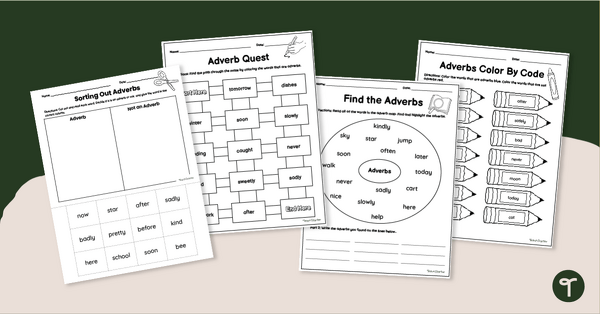
Adverb Worksheets PDF - Grade 1
Use this printable Adverb Worksheets PDF - Grade 1 Resource to help your little learners practice identifying adverbs.
- Plus Plan
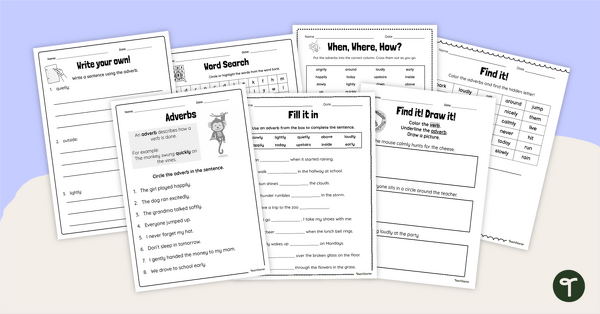
Adverbs for 2nd Graders – Worksheet Pack
Adverb practice doesn't have to be a struggle. Use these worksheets for 2nd graders in your classroom.
- Free Plan
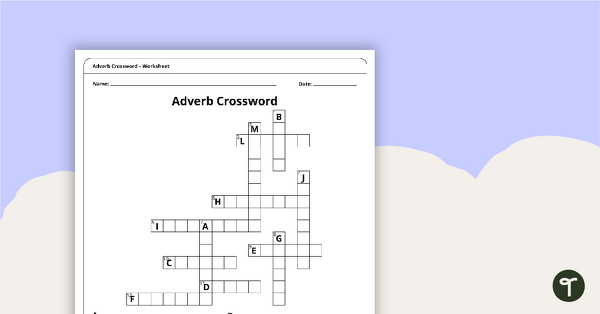
Adverb Crossword – Worksheet
A crossword for students to review different adverbs.
- Plus Plan
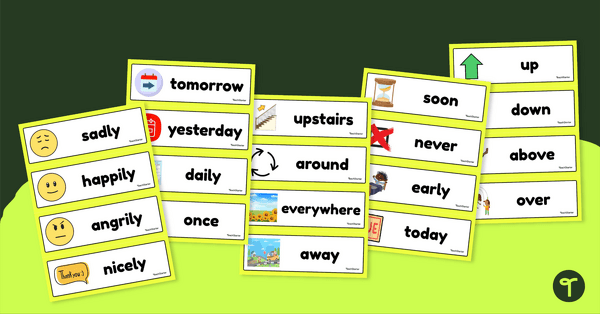
Adverb Vocabulary Cards
Display this word wall featuring a list of adverbs in your classroom to encourage your students to explore and use adverbs in their writing!
- Plus Plan
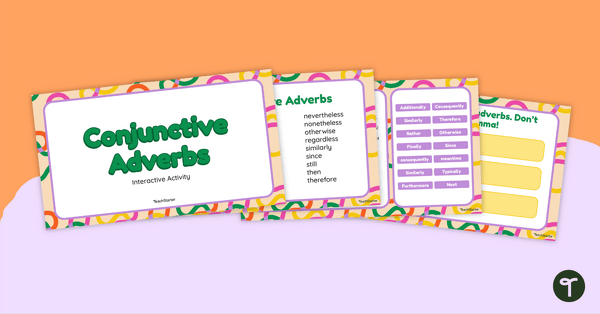
Conjunctive Adverb Interactive Activity
Use this engaging interactive activity in your classroom to teach students what conjunctive adverbs are and how to use them in their writing.
- Plus Plan
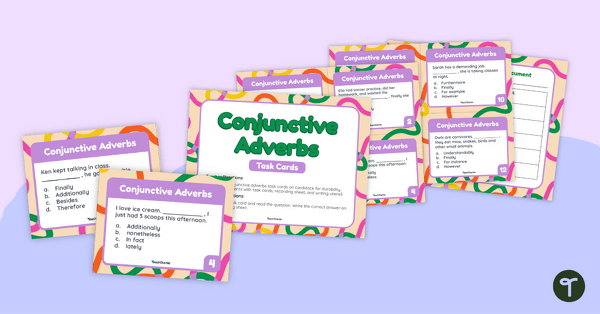
Conjunctive Adverbs Task Cards
Assess your students’ understanding of conjunctive adverbs with these fun adverbs task cards!
- Plus Plan
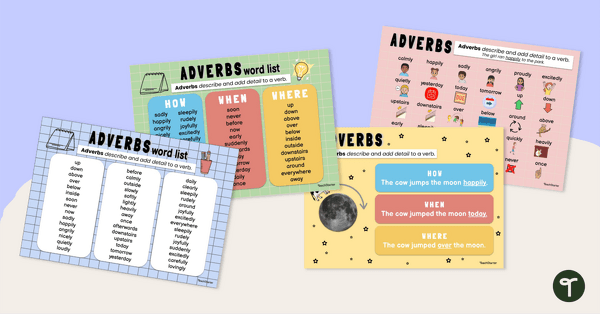
Adverb List Posters
Display this poster set (including a list of adverbs) in your classroom to encourage your students to explore and use adverbs in their writing!
- Plus Plan
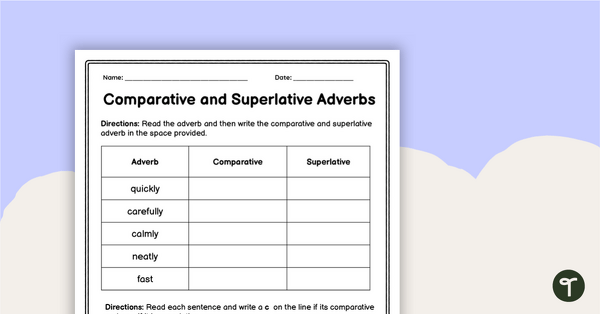
Comparative and Superlative Adverb Worksheet
Use this comparative and superlative adverbs worksheet to check students understanding of this grammar concept in your classroom
- Plus Plan
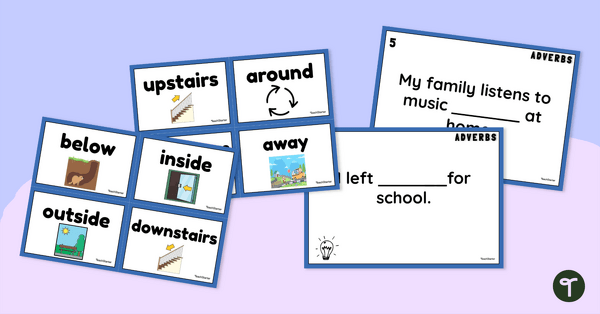
Adverb Whole Class Game
Teach your students how to use adverbs to add detail in simple sentences with this fun whole-class game!
- Plus Plan
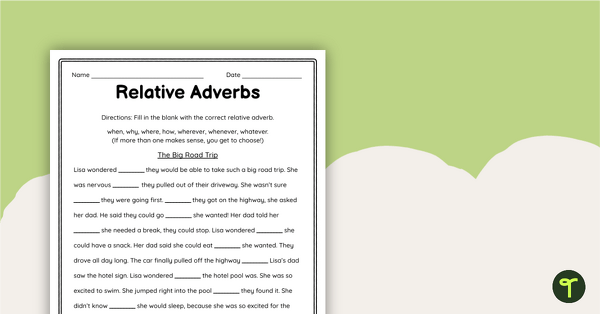
Relative Adverbs Worksheet Pack
Use this pack of five worksheets to help your students practice the correct use of relative adverbs in text.
- Plus Plan
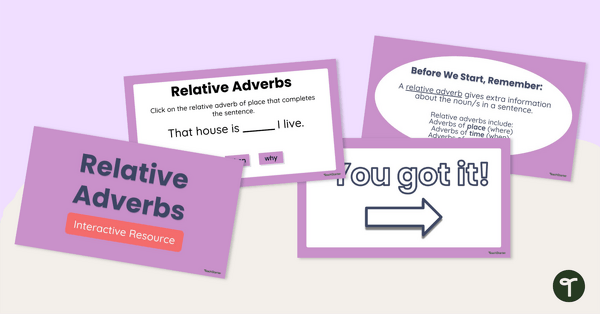
Relative Adverbs Interactive Activity
Use this relative adverbs interactive activity as a warm up for your grammar lesson or to refresh students’ memories before a writing session!
- Plus Plan
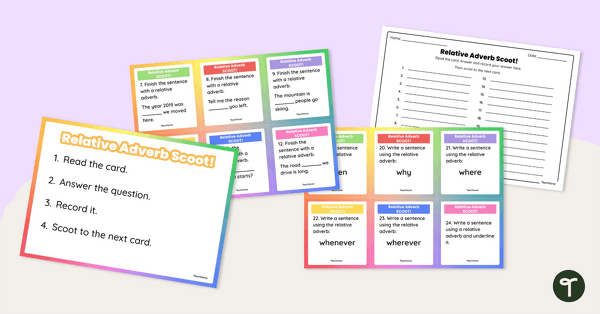
Relative Adverb Scoot Game
Use this relative adverbs scoot game as a warm up or active learning activity to add some color to your grammar lesson!
- Plus Plan
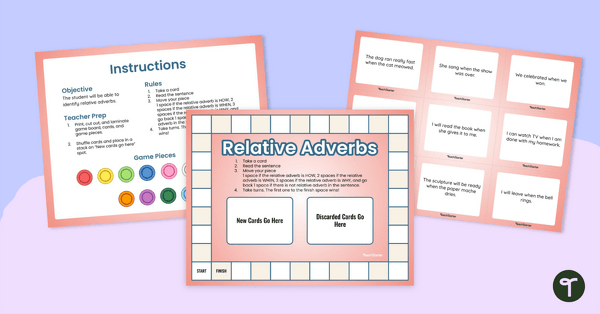
Relative Adverbs Game
Incorporate this relative adverbs board game into your literacy rotations or as a fast finisher activity to reinforce the concept of relative adverbs.
- Plus Plan
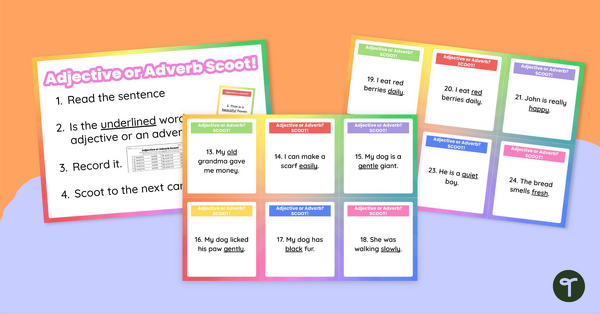
Adjective and Adverb Scoot Game
Scoot! This fun active learning game will have your students up and about on an adverb and adjective adventure around your classroom!
- Plus Plan
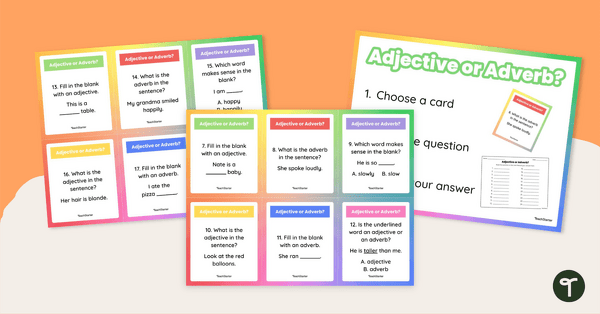
Adjective or Adverb? Task Cards
Use this set of 24 task cards to help students understand where an adverb or an adjective is the correct modifier in a sentence.
- Plus Plan
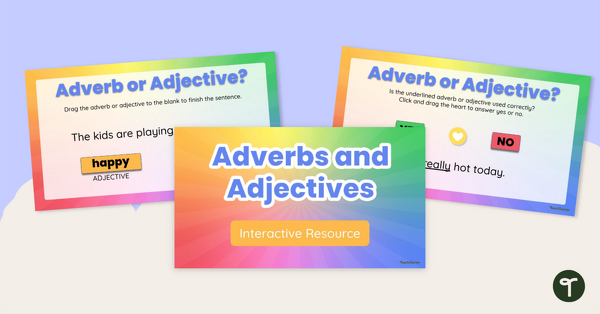
Adverbs and Adjectives Interactive Activity
Share this interactive drag-and-drop activity with your students to allow them to practice the correct use of adverbs and adjectives in the English language.
- Plus Plan
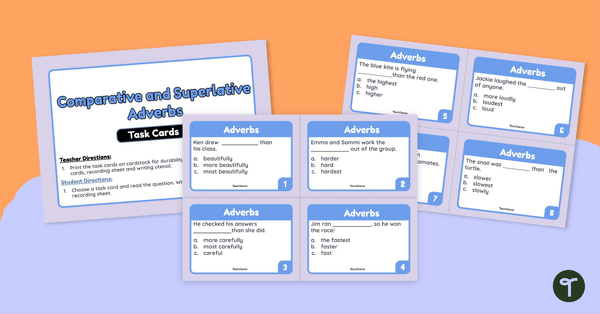
Comparative and Superlative Adverb Task Cards
Introduce these comparative and superlative adverbs task cards to your class to grow their understanding of these types of adverbs!
- Plus Plan
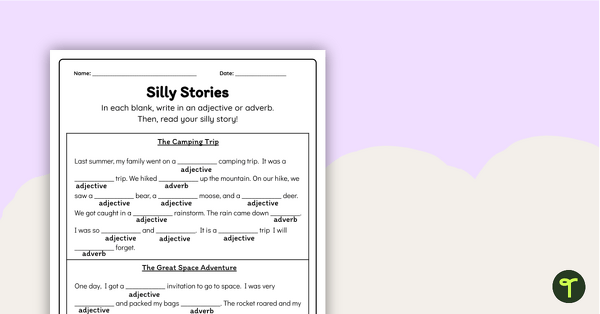
Adjectives and Adverbs Worksheets (Silly Stories)
Have fun with your students creating silly stories together while teaching and learning about parts of speech (adverbs and adjectives)!
- Plus Plan
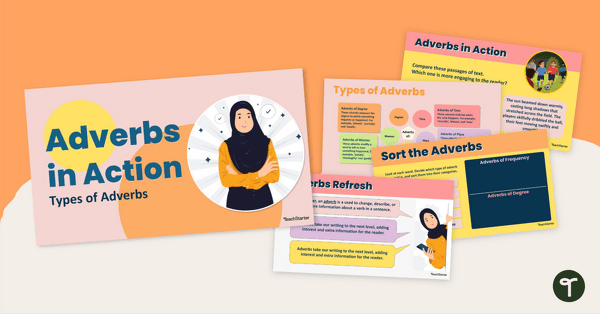
Types of Adverbs Teaching Slides
Explore five types of adverbs in this action-packed adverb adventure teaching slide deck! This resource covers adverbs of time, place, manner, frequency and degree.
- Plus Plan
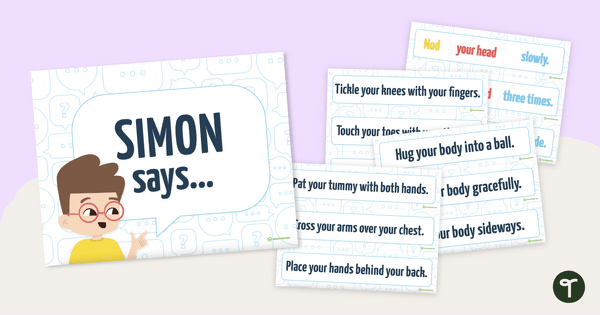
"Simon Says" Commands - Card Deck
A set of 24 instruction cards to use when playing "Simon Says."
- Plus Plan
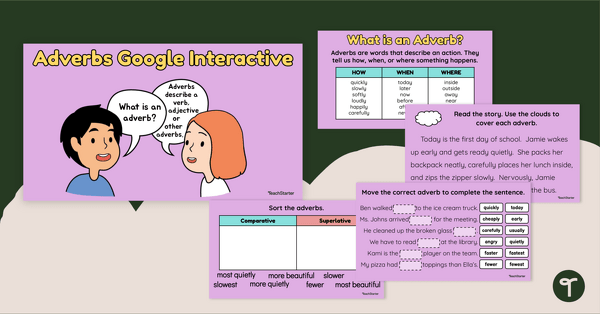
Adverbs Google Interactive
Provide your students with engaging, interactive activities to help them improve their usage and identification of adverbs.
- Plus Plan
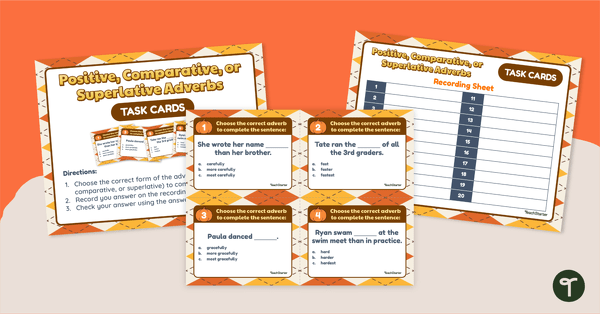
Positive, Comparative, and Superlative Adverbs Task Cards
Practice using positive, comparative, and superlative adverbs in sentences with a set of adverb task cards.
- Plus Plan
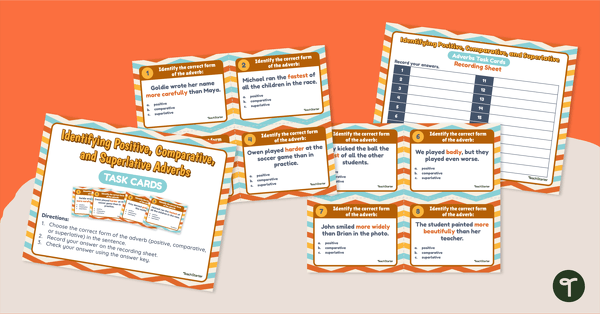
Identifying Positive, Comparative, and Superlative Adverbs - Task Cards
Identify positive, comparative, and superlative adverbs in sentences with a set of twenty task cards.
- Plus Plan
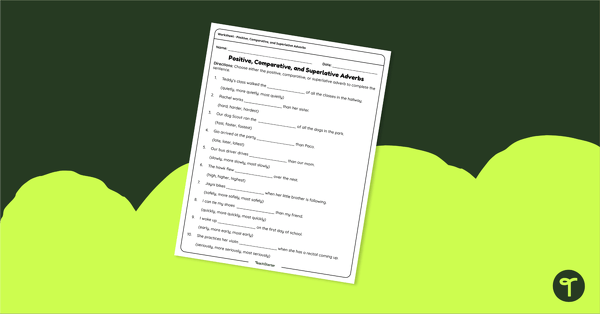
Positive, Comparative, Superlative Adverbs Worksheet
Practice using positive, comparative, and superlative adverbs with an adverb worksheet.
- Plus Plan
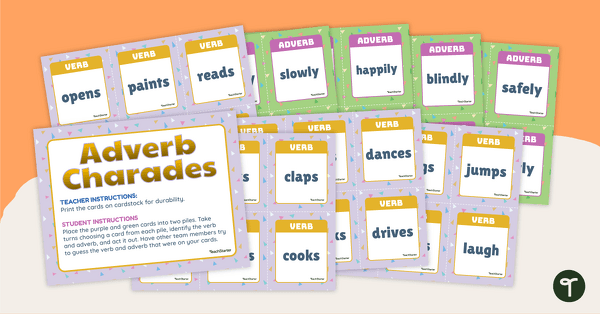
Adverbs Activity - Grammar Charades
Have some fun and build grammar skills with an adverb charades activity.
- Plus Plan
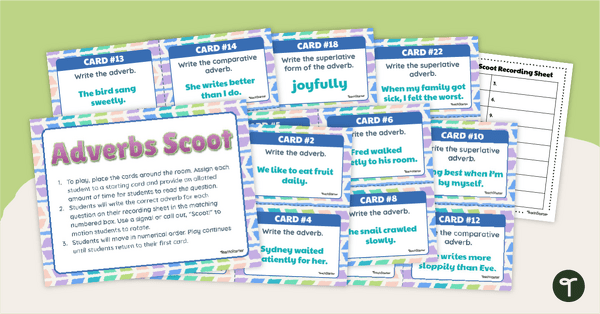
Adverbs Scoot
Build vocabulary and grammar skills with a game of Comparative and Superlative Adverbs SCOOT!
- Plus Plan
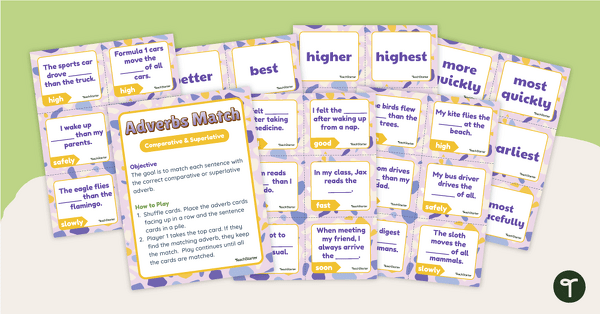
Adverbs Match-Up
Skip those comparative and superlative adverb worksheets and try out an adverb matching game.
- Free Plan
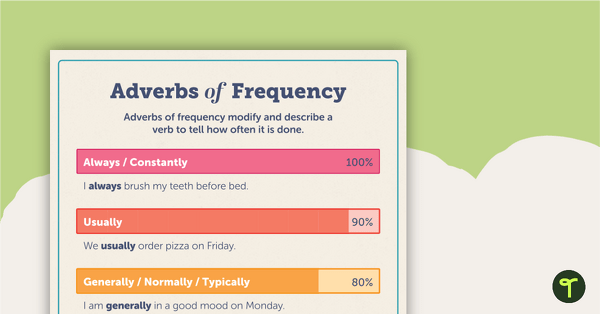
Adverbs of Frequency Poster
Use this eye-catching poster in your primary classroom when teaching children about adverbs of frequency.
- Plus Plan
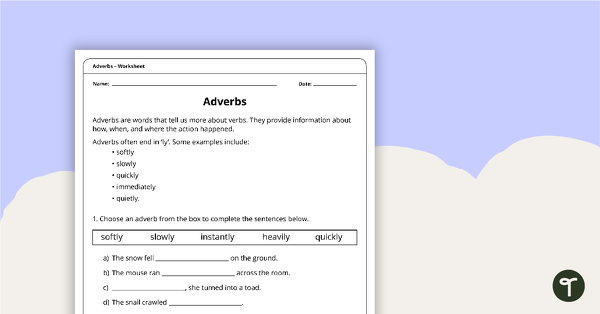
Adverbs Worksheet
A 2 page worksheet that explores the use of adverbs.
- Plus Plan
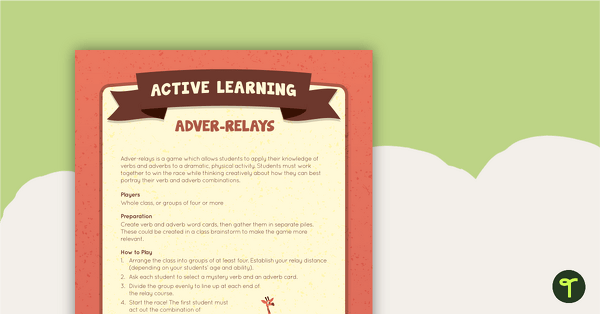
Adver-relays Active Learning Game
A whole class active game that encourages learning through a physical setting.
- Plus Plan
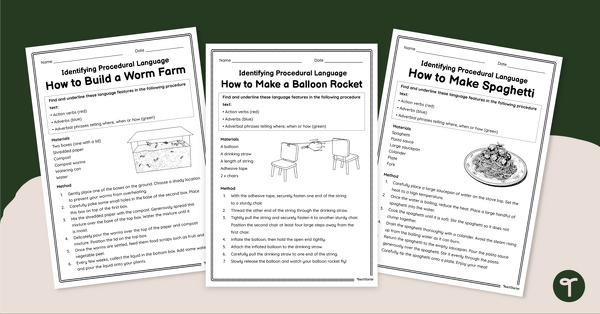
Identifying Procedural Language Worksheets
Help your students identify procedural language with this set of three worksheets.
- Plus Plan
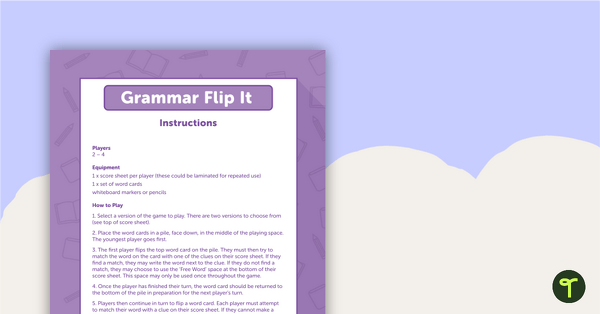
Adverb Grammar Card Game - Flip It!
Reinforce your students understanding of adverbs with this fun card game.